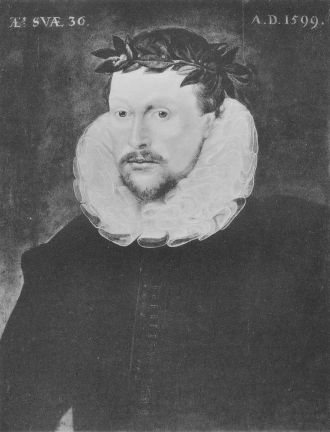1606 - Drayton, Michael - Sixt Eglog
| Allusion | |
|---|---|
| Date | c. 1606? |
| Author | Drayton, Michael |
| Title | The Sixt Eglog |
| Mentions | Robin Hood; Wynkyn de Worde; Gawain; Sir Guy; Clim of the Clough [ballad of Adam Bell] |

By Henrik Thiil Nielsen, 2013-07-16. Revised by Henrik Thiil Nielsen, 2021-01-07.
Allusion
Gorbo.
What maist thou be that ould Winken de word,
that of all shepheards wert the man alone,
that once with laughter shook'st the shepheardes
with thyne own madnes lastly ouerthrown (boord
I think thou dotst in thy declining age.
Or for the loosnesse of thy youth art sory, [p. 69:]
and therefore vowed som solemn pilgrimage
to holy Hayles, or Patricks purgatory,
Come sit we down vnder this Hawthorn tree,
the morrows light shall lend vs day enough,
And let vs tel of Gawen, or Sir Guy.
Of Robin-hood, or of ould Clim a Clough,
Or els some Romant vnto vs areede,
By former shepheards taught thee in thy youth,
Of noble Lords and Ladies gentle deed
Or of thy Loue or of thy lasses trueth.
Winken.
Shepheard no no, that world with me is past,
Merry was it when we those toys might tell
But tis not now as when thou sawst me last
A great mischance me since that time befel,
Elphin is dead, and in his graue is layde,
O to report it, how my hart it greueth,
Cruel that fate that so the time betrayd
And of our ioyes vntimely vs depriueth.[1]
Source notes
P. 69, Marginal note to "holy Hayles": "An ancient Pilgrimage in Glostershire, called the holy rood of Hayles."
IRHB comments
The two shepherds in this eclogue are named Garbo and Winken de word. Wynkyn de Worde, William Caxton's successor, was the printer of the earliest edition of the Gest that survives in toto. "Clim a Clough" is one of the three heroes of the ballad of Adam Bell, Clim of the Clough, and William of Cloudesly. Sir Guy is presumably Guy of Warwick. The word "boord" in line four is run over from line three (as in printed source).
Lists
- Not included in Dobson, R. B., ed.; Taylor, J., ed. Rymes of Robyn Hood: an Introduction to the English Outlaw (London, 1976), pp. 293-11.
- Outside scope of Sussex, Lucy, compil. 'References to Robin Hood up to 1600', in: Knight, Stephen. Robin Hood: A Complete Study of the English Outlaw (Oxford, UK; Cambridge, Massachusetts: Blackwell, 1994), pp. 262-88.
Sources
- Drayton, Michael. Poemes lyrick and pastorall. Odes, eglogs, the man in the moone (London, [1606?]). Not seen.
Also see
Notes
